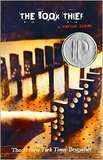The Book Thief
In all fairness, my teen librarian recommended this book to me when it first came out. I finally checked it out, though, when robinmckinley said she was buying it for everyone on her Christmas list. (Yes, it took me six weeks to listen to it… why do you ask?)

The Book Thief by Markus Zusak. Read by Alan Corduner It is Germany, early in World War II. Our narrator is Death. He introduces us to our heroine, Liesel Memminger, when he first meets her. She is on the train on her way to a foster home with her mother and brother, except that her brother dies on the train. At the graveyard where they stop to bury him, she steals her first book: a gravedigger’s manual that the apprentice gravedigger dropped in the snow. It takes time to make a new home, but Liesel slowly begins to fit into her new family on Himmel Street, the poor section of a small town outside Munich. Her new Mama may call her a Saumensch, but her Papa has kind silver eyes and plays a mean accordion. Rudy, the boy next door, has hair the color of lemons and a developing crush on her. Soon her circle of friends expands to include Max, a young Jewish man that they hide in their basement. Papa, barely literate himself, teaches Liesel to read. She plays soccer on the street and steals food and books with Rudy as food rations get tighter and she runs out of books to read. It is only a side note as Death notes the passing of the years and complains about the increasing number of souls that he is expected to ferry away, as we are so involved with daily life on Himmel Street.
Towards the end of the book, Rudy is in his living room building a gigantic domino structure with his younger sisters. He is trying to eavesdrop as his parents, in the kitchen, argue with the SS officers, who want to send Rudy to a special Hitler Youth school. The children have filled the room with dominoes, snaking from all around the room to a central point. Rudy turns out the lights and lights a match as the whole structure comes toppling down. And, just like that, the strands of plot that we were contentedly watching come together and we remember that things do not end happily in Nazi Germany. Even though this was the point where I couldn’t sleep for four hours one night, the book is not a thriller. Death knows what’s coming, and lets us know, a little at a time. He is a careful observer of humanity, and describes things in beautiful and original language. The people and places of Germany are perfectly described. In the audio book, Alan Corduner’s deep, slightly British voice is perfect for Death. He appears to be fluent in German, as well, pronouncing the German words perfectly and giving the characters authentic German accents together with unique character voices. This is a truly beautiful book.

The Book Thief by Markus Zusak. Read by Alan Corduner It is Germany, early in World War II. Our narrator is Death. He introduces us to our heroine, Liesel Memminger, when he first meets her. She is on the train on her way to a foster home with her mother and brother, except that her brother dies on the train. At the graveyard where they stop to bury him, she steals her first book: a gravedigger’s manual that the apprentice gravedigger dropped in the snow. It takes time to make a new home, but Liesel slowly begins to fit into her new family on Himmel Street, the poor section of a small town outside Munich. Her new Mama may call her a Saumensch, but her Papa has kind silver eyes and plays a mean accordion. Rudy, the boy next door, has hair the color of lemons and a developing crush on her. Soon her circle of friends expands to include Max, a young Jewish man that they hide in their basement. Papa, barely literate himself, teaches Liesel to read. She plays soccer on the street and steals food and books with Rudy as food rations get tighter and she runs out of books to read. It is only a side note as Death notes the passing of the years and complains about the increasing number of souls that he is expected to ferry away, as we are so involved with daily life on Himmel Street.
Towards the end of the book, Rudy is in his living room building a gigantic domino structure with his younger sisters. He is trying to eavesdrop as his parents, in the kitchen, argue with the SS officers, who want to send Rudy to a special Hitler Youth school. The children have filled the room with dominoes, snaking from all around the room to a central point. Rudy turns out the lights and lights a match as the whole structure comes toppling down. And, just like that, the strands of plot that we were contentedly watching come together and we remember that things do not end happily in Nazi Germany. Even though this was the point where I couldn’t sleep for four hours one night, the book is not a thriller. Death knows what’s coming, and lets us know, a little at a time. He is a careful observer of humanity, and describes things in beautiful and original language. The people and places of Germany are perfectly described. In the audio book, Alan Corduner’s deep, slightly British voice is perfect for Death. He appears to be fluent in German, as well, pronouncing the German words perfectly and giving the characters authentic German accents together with unique character voices. This is a truly beautiful book.